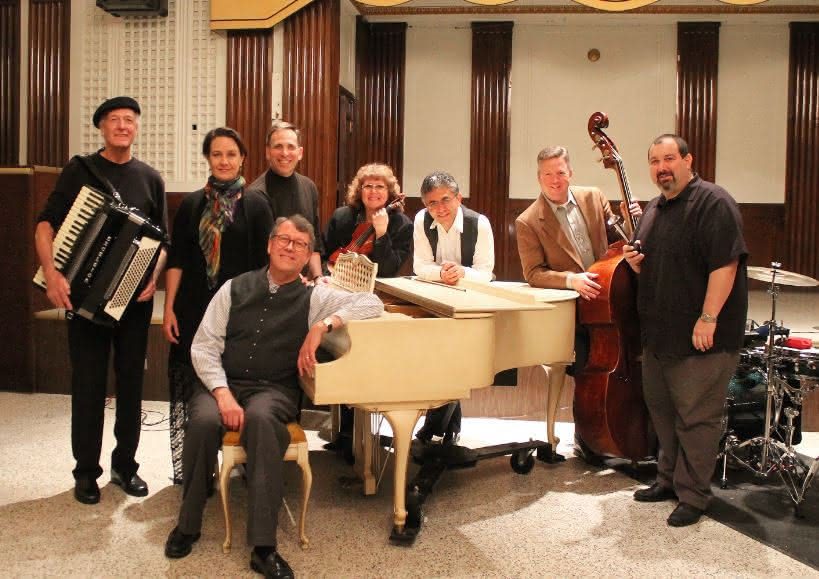 Como soa um cabaré judeu? Este é um som diferente do fenômeno klezmer, que existe em torno de festas e danças. As canções de cabaré neste disco têm relação com certos tipos de música de salão dos primeiros anos do século 20 e freqüentemente comentam a vida no exílio, provocando diversão satírica sobre as autoridades e as aflições da sociedade. Como referência adicional, eles podem, de certa forma, ser comparados com obras mais familiares, mas similares, como A Ópera dos Três Vinténs, de Kurt Weill. A New Budapest Orpheum Society é um conjunto da Universidade de Chicago. É formado por um grupo misto de vocalistas (Julia Bentley, mezzo-soprano e Stewart Figa, barítono) e instrumentistas (Iordanka Kisslova, violino; Stewart Miller, baixo de corda; Hank Tausend, percussão; e Ilya Levinson, piano).
Como soa um cabaré judeu? Este é um som diferente do fenômeno klezmer, que existe em torno de festas e danças. As canções de cabaré neste disco têm relação com certos tipos de música de salão dos primeiros anos do século 20 e freqüentemente comentam a vida no exílio, provocando diversão satírica sobre as autoridades e as aflições da sociedade. Como referência adicional, eles podem, de certa forma, ser comparados com obras mais familiares, mas similares, como A Ópera dos Três Vinténs, de Kurt Weill. A New Budapest Orpheum Society é um conjunto da Universidade de Chicago. É formado por um grupo misto de vocalistas (Julia Bentley, mezzo-soprano e Stewart Figa, barítono) e instrumentistas (Iordanka Kisslova, violino; Stewart Miller, baixo de corda; Hank Tausend, percussão; e Ilya Levinson, piano).
New Budapest Orpheum Society: Jewish Cabaret In Exile
I. The Great Ennui on the Eve of Exile
Edmund Nick (1891–1973) & Erich Kästner (1899–1974)
1 Die möblierte Moral / The Well-Furnished Morals (1:48)
2 Das Wiegenlied väterlicherseite / The Father’s Lullaby (4:49)
3 Die Elegie in Sachen Wald / Elegy in the Forest of Things (3:29)
4 Der Gesang vom verlorenen Sohn / The Song of the Lost Son (5:13)
5 Das Chanson für Hochwohlgeborene / The Chanson for Those Who Are Born Better (2:43)
6 Der Song “man müßte wieder . . .”/ The Song “Once Again One Must . . .” (3:59)
II. The Exiled Language — Yiddish Songs for Stage and Screen
7 Moses Milner (1886–1953): In Cheider / In the Cheder (5:46)
8 Mordechai Gebirtig (1877–1942): Avreml, der Marvikher / Abe, the Pickpocket (5:12)
9 Abraham Ellstein (1907–1963): Tif vi di Nacht / Deep as the Night (3:07)
III. Transformation of Tradition
Hanns Eisler (1898–1962):
From Zeitungsausschnitte, Op. 11 (Newspaper Clippings)
10 Mariechen / Little Marie (1:49)
11 Kriegslied eines Kindes / A Child’s Song of War (2:32)
IV. The Poetics of Exile: Songs by Hanns Eisler and Kurt Tucholsky (1890–1935)
12 Heute zwischen Gestern und Morgen / Today between Yesterday and Tomorrow (2:35)
13 Bügerliche Wohltätigkeit / Civic Charity (3:01)
14 Zuckerbrot und Peitsche / Sweetbread and Whips (2:20)
15 An den deutschen Mond / To the German Moon (2:46)
16 Einigkeit und Recht und Freiheit / Unity and Justice and Freedom (1:53)
17 Couplet für die Bier-Abteilung / Couplet for the Beer Department (1:26)
V. Traumas of Inner Exile
Viktor Ullmann (1898–1944)
Three Yiddish Songs (Brezulinka), op. 53 (1944)
18 Berjoskele / The Little Birch (4:18)
19 Margaritkele / Little Margaret (1:37)
20 Ich bin a Maydl in di Yorn / I’m Already a Young Woman (1:30)
VI. Nostalgia and Exile
21 Georg Kreisler (b. 1922): Tauben vergiften / Poisoning Pigeons (2:46)
22 Hermann Leopoldi (1888–1959) and Robert Katscher (1894–1942): Ich bin ein unverbesserlicher Optimist / I’m an Irrepressible Optimist (3:46)
23 Misha Spoliansky (1898–1985) / Marcellus Schiffer (1892–1932): Heute Nacht oder nie / Tonight or Never (3:22)
VII. Exile in Reprise
Friedrich Holländer on Stage and Film
24 Friedrich Holländer (1896–1976): Marianka (2:32)
25 Wenn der Mond, wenn der Mond . . . / If the Moon, If the Moon . . . (3:00) Lyrics by Theobald Tiger (Kurt Tucholsky)
Baritone Vocals – Stewart Figa
Bass – Stewart Miller (2)
Drums – Henry Tausend
Ensemble – New Budapest Orpheum Society
Mezzo-soprano Vocals – Julia Bentley
Music Director – Philip V. Bohlman
Piano – Ilya Levinson
Violin – Iordanka Kissiova

PQP
PQP, queira me perdoar, mas não posso deixar escapar o maio dos 500 anos de despedida de Leonardo, este ser extra-terrestre que nos visitou antes de nós, brasileiros atuais, sermos o que somos. Contemporâneo de Gutenberg, Maquiavel e Colombo, intrépido seria muito pouco para classificá-lo dentre os viventes. Modestamente, e atrasado, deixo uma pegada para a eventual apreciação dos que aqui bebem.
https://www.youtube.com/watch?v=-2Py_-Q7x2U
Muito bom!